|
 |
 |
|
叶乃芳
叶乃芳先生,上海人。南开大学外文系俄语教授。我班的外国文学课教授。 中文系的朱维之教授和外文系的邹金泰教授都曾代过外国文学课。
|
English Poet Samuel Taylor Coleridge (1772-1834) |
|
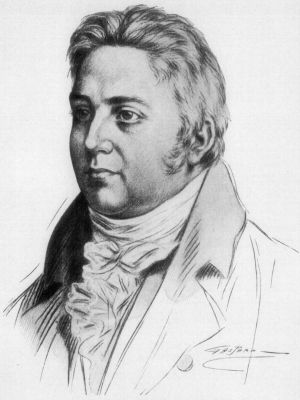 Portrait of Samuel Coleridge
Portrait of Samuel Coleridge.
(This work of art is in the public domain.) |
Samuel Taylor Coleridge was an English poet, critic and philosopher who was, along with his friend William Wordsworth, one of the founders of the Romantic Movement in England and one of the Lake Poets.
Coleridge was born on 21 October 1772 in the rural town of Ottery St Mary, Devon. He was the youngest of ten children, and his father, the Reverend John Coleridge, was a well respected vicar. The young Coleridge suffered from constant ridicule by his older brother Frank, partially due to jealousy, as Samuel was often praised and favoured by his parents. To escape this abuse, he frequently sought refuge at a local library, which led him to discover his passion for poetry.
He is probably best known for his poems The Rime of the Ancient Mariner and Kubla Khan, as well as his major prose work Biographia Literaria. His critical work, especially on Shakespeare, was and remains highly influential, and he helped introduce German idealist philosophy to English-speaking culture. He actually coined many familiar words and phrases, including the celebrated suspension of disbelief. He was a major influence, via Emerson, on American transcendentalism.However, he was tormented for much of his life by crippling anxiety and depression, for which he attempted to self-medicate himself with opium, becoming addicted.
The years 1797 and 1798, during which he lived in what is now known as Coleridge Cottage, in Nether Stowey, Somerset, were among the most fruitful of Coleridge's life. In 1795, Coleridge met poet William Wordsworth and his sister Dorothy. (Wordsworth, having visited him and being enchanted by the surroundings, rented Alfoxton Park, a little over three miles [5 km] away.) Besides the Rime of The Ancient Mariner, he composed the symbolic poem Kubla Khan, written—Coleridge himself claimed—as a result of an opium dream, in "a kind of a reverie"; and the first part of the narrative poem Christabel. The writing of Kubla Khan, written about the Asian emperor Kublai Khan, was said to have been interrupted by the arrival of a "Person from Porlock"—an event that has been embellished upon in such varied contexts as science fiction and Nabokov's Lolita. During this period, he also produced his much-praised "conversation" poems This Lime-Tree Bower My Prison, Frost at Midnight, and The Nightingale.
In 1798, Coleridge and Wordsworth published a joint volume of poetry, Lyrical Ballads, which proved to be the starting point for the English romantic movement. Though the productive Wordsworth contributed more poems, Coleridge's first version of The Rime of the Ancient Mariner was the longest poem and drew more immediate attention than anything else in the volume.
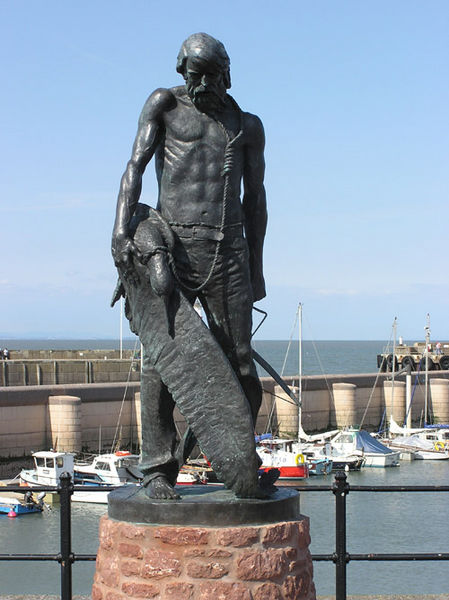
A statue of the Ancient Mariner at Watchet Harbour, Somerset, England, unveiled in September 2003 as a tribute to Samuel Taylor Coleridge. Coleridge lived in the nearby village of Nether Stowey, about 10 miles from this statue. In 1797, while on a walking tour, Coleridge visited Watchet. On seeing the harbour, it is believed he was inspired to compose The Rime of the Ancient Mariner. (The sculptor was Alan B Herriot of Penicuik, Scotland.)
(This image has been released into the public domain by its author, Arpingstone)
|
KUBLA KAHN
by Samuel Taylor Coleridge
- IN Xanadu did Kubla Khan
- A stately pleasure-dome decree:
- Where Alph, the sacred river, ran
- Through caverns measureless to man
- Down to a sunless sea.
- So twice five miles of fertile ground
- With walls and towers were girdled round:
- And there were gardens bright with sinuous rills
- Where blossom'd many an incense-bearing tree;
- And here were forests ancient as the hills,
- Enfolding sunny spots of greenery.
-
- But O, that deep romantic chasm which slanted
- Down the green hill athwart a cedarn cover!
- A savage place! as holy and enchanted
- As e'er beneath a waning moon was haunted
- By woman wailing for her demon-lover!
- And from this chasm, with ceaseless turmoil seething,
- As if this earth in fast thick pants were breathing,
- A mighty fountain momently was forced;
- Amid whose swift half-intermitted burst
- Huge fragments vaulted like rebounding hail,
- Or chaffy grain beneath the thresher's flail:
- And 'mid these dancing rocks at once and ever
- It flung up momently the sacred river.
- Five miles meandering with a mazy motion
- Through wood and dale the sacred river ran,
- Then reach'd the caverns measureless to man,
- And sank in tumult to a lifeless ocean:
- And 'mid this tumult Kubla heard from far
- Ancestral voices prophesying war!
-
- The shadow of the dome of pleasure
- Floated midway on the waves;
- Where was heard the mingled measure
- From the fountain and the caves.
- It was a miracle of rare device,
- A sunny pleasure-dome with caves of ice!
-
- A damsel with a dulcimer
- In a vision once I saw:
- It was an Abyssinian maid,
- And on her dulcimer she play'd,
- Singing of Mount Abora.
- Could I revive within me,
- Her symphony and song,
- To such a deep delight 'twould win me,
- That with music loud and long,
- I would build that dome in air,
- That sunny dome! those caves of ice!
- And all who heard should see them there,
- And all should cry, Beware! Beware!
- His flashing eyes, his floating hair!
-
- Weave a circle round him thrice,
- And close your eyes with holy dread,
- For he on honey-dew hath fed,
- And drunk the milk of Paradise.
|
THE RIME OF THE ANCYENT MARINERE
PART ONE
ARGUMENT.
How a ship having passed the Line was driven by Storms to the cold Country towards the South Pole; and how from thence she made her course to the tropical Latitude of the Great Pacific Ocean; and of the strange things that befell; and in what manner the Ancyent Marinere came back to his own Country.
I.
It is an ancyent Marinere,
And he stoppeth one of three:
"By thy long grey beard and thy glittering eye
"Now wherefore stoppest me?
The bridegroom's doors are open'd wide
"And I am next of kin;
"The Guests are met, the Feast is set,--
"May'st hear the merry din.
But still he holds the wedding-guest--
There was a Ship, quoth he--
"Nay, if thou'st got a laughsome tale,
"Marinere! come with me."
He holds him with his skinny hand,
Quoth he, there was a Ship--
"Now get thee hence, thou grey-beard Loon!
"Or my Staff shall make thee skip.
He holds him with his glittering eye--
The wedding guest stood still
And listens like a three year's child;
The Marinere hath his will.
The wedding-guest sate on a stone,
He cannot chuse but hear:
And thus spake on that ancyent man,
The bright-eyed Marinere.
The Ship was cheer'd, the Harbour clear'd--
Merrily did we drop
Below the Kirk, below the Hill,
Below the Light-house top.
The Sun came up upon the left,
Out of the Sea came he:
And he shone bright, and on the right
Went down into the Sea.
Higher and Higher every day,
Till over the mast at noon--
The wedding-guest here beat his breast,
For he heard the loud bassoon.
The Bride hath pac'd into the Hall,
Red as a rose is she;
Nodding their heads before her goes
The merry Minstralsy.
The wedding-guest he beat his breast
Yet he cannot chuse but hear:
And thus spake on that ancyent Man,
The bright-eyed Marinere.
Listen, Stranger! Storm and Wind,
A Wind and Tempest strong!
For days and weeks it play'd us freaks--
Like Chaff we drove along.
Listen, Stranger! Mist and Snow,
And it grew wond'rous cauld:
And Ice mast-high came floating by
As green as Emerauld.
And thro' the drifts the snowy clifts
Did send a dismal sheen;
Ne shapes of men ne beasts we ken--
The Ice was all between.
The Ice was here, the Ice was there,
The Ice was all around:
It crack'd and growl'd, and roar'd and howl'd--
Like noises of a swound.
At length did cross an Albatross,
Thorough the Fog it came;
And an it were a Christian Soul,
We hail'd it in God's name.
The Marineres gave it biscuit-worms,
And round and round it flew:
The Ice did split with a thunder-fit;
The Helmsman steer'd us thro'.
And a good south wind sprung up behind,
The Albatross did follow;
And every day for food or play
Came to the Marinere's hollo!
In mist or cloud on mast or shroud
It perch'd for vespers nine,
Whiles all the night thro' [fog-smoke white]
Glimmer'd the white moon-shine.
"God save thee, ancyent Marinere!
"From the fiends that plague thee thus--
"Why look'st thou so?"--with my cross bow
I shot the Albatross.
|
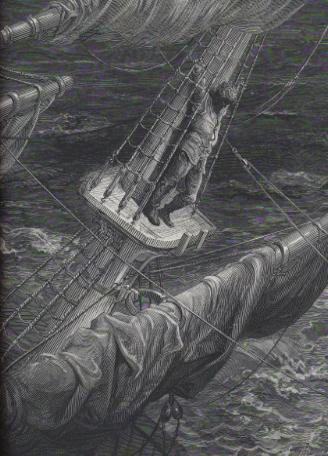
The Mariner up on the mast in a storm.
One of the wood engraved illustrations by Gustave Doré (1832-1883)
(This work of art is in the public domain.)
|
|
EPITAPH ON AN INFANT
by Samuel Taylor Coleridge
- ERE Sin could blight or Sorrow fade,
- Death came with friendly care;
- The opening bud to Heaven conveyed,
- And bade it blossom there.
|
Work Without Hope
by Samuel Taylor Coleridge |
|
All Nature seems at work. Slugs leave their lair--
The bees are stirring--birds are on the wing--
And WINTER slumbering in the open air,
Wears on his smiling face a dream of Spring !
And I, the while, the sole unbusy thing,
Nor honey make, nor pair, nor build, nor sing.
Yet well I ken the banks where Amaranths blow,
Have traced the fount whence streams of nectar flow.
Bloom, O ye Amaranths ! bloom for whom ye may,
For me ye bloom not ! Glide, rich streams, away !
With lips unbrightened, wreathless brow, I stroll :
And would you learn the spells that drowse my soul ?
WORK WITHOUT HOPE draws nectar in a sieve,
And HOPE without an object cannot live. |
|
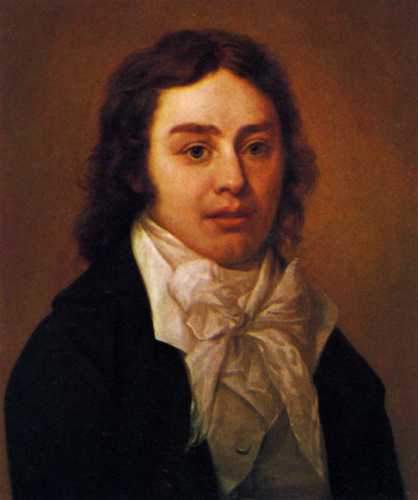
Coleridge when 23, by Peter Vandyke (1729-1799).
(This work of art is in the public domain.)
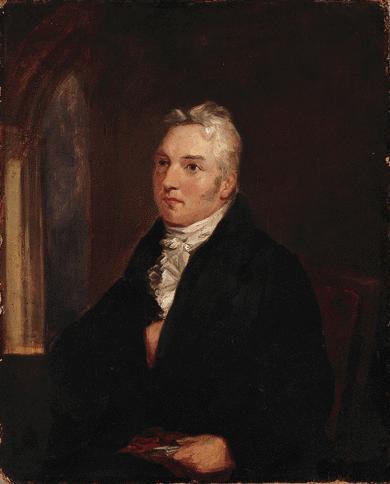
Portrait of Pensive Coleridge, drawn during his life time.
(This work of art is in the public domain.)
 
|
|









